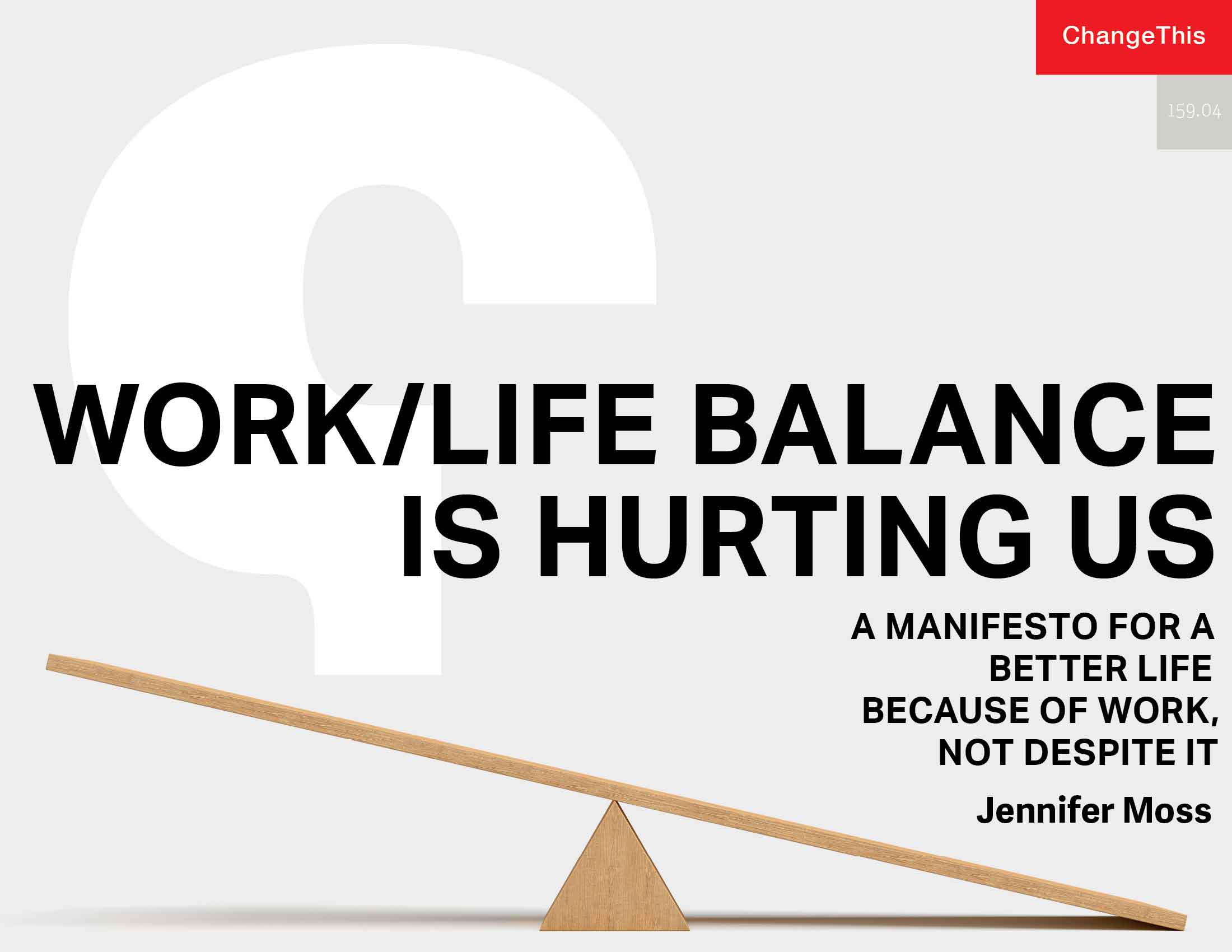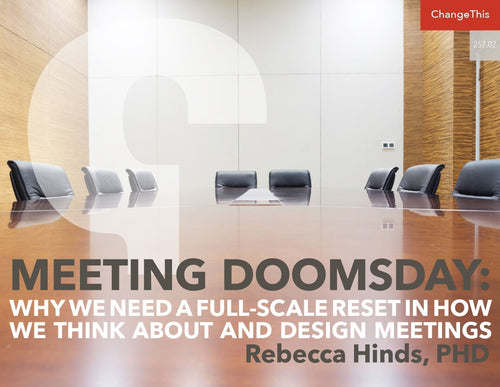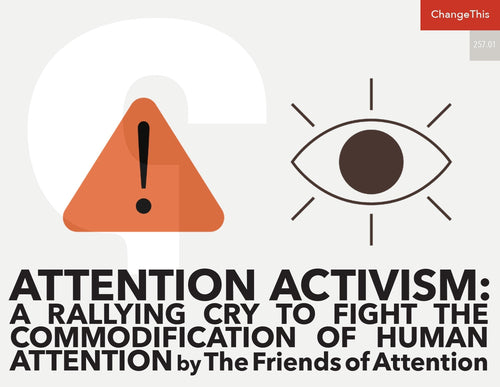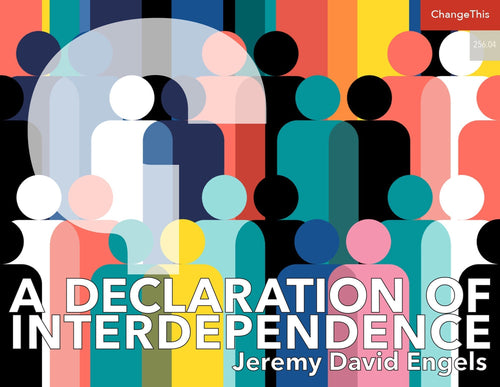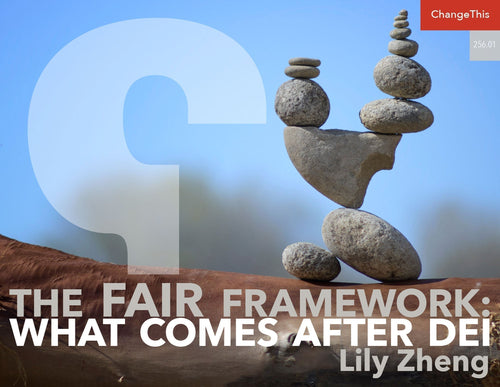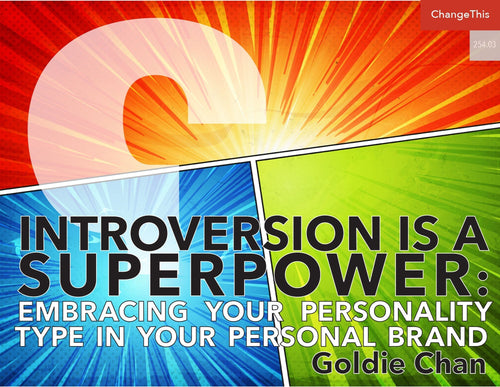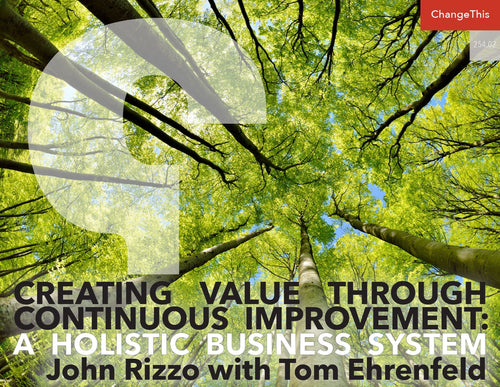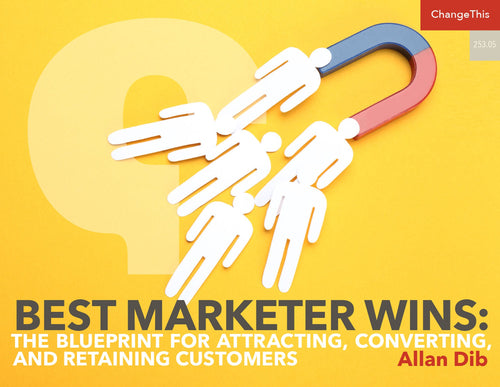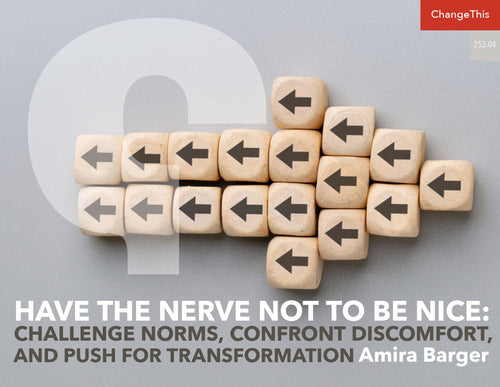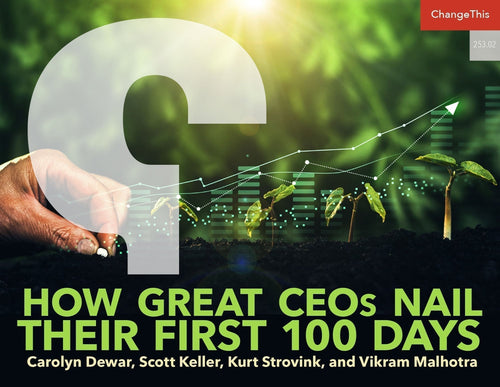Work/Life Balance Is Hurting Us: A Manifesto for a Better Life Because of Work, Not Despite It
Why?
Because it makes us believe that work is hard and horrible—that life is fun and work is tolerated. Too many of us cling to the weekend after just 'getting by' every other day of the week. Life shouldn't begin on Friday and end on Sunday."
I believe that work/life balance is killing us.
Why?
Because it makes us believe that work is hard and horrible—that life is fun and work is tolerated. Too many of us cling to the weekend after just “getting by” every other day of the week. Life shouldn’t begin on Friday and end on Sunday.
I understand why so many people feel this way. In the past, there was a solid rationale for bifurcating these two existences. Less than a century ago, rural farming was still an important occupation and the working class was often divided by socioeconomic status with the wealthiest making up only a small percentage of the total labor force. Most of the working class struggled to make a decent living in factories, shipyards, and farming. Men, women and children worked in sweatshops, often receiving pay that was incommensurate with their labor. For many, work was just another harsh and intolerable condition to endure.
Sadly, I see that history holding us back. Yes, there are still areas of the economy and the world where this type of unfair laboring still occurs, and we absolutely still need to tackle this serious problem. But I don’t believe that is the reason most people see work as a lifelong endurance test rather than a place to find meaning, accomplishment, and joy.
Did you know that the average person spends 90,000 hours at work over their lifetime? Yet, we still make an exhaustive effort to keep our work lives and our home lives separate.
Unfortunately, with global engagement resting at about 13% (Gallup 2015), it still feels like work isn’t that much more tolerable despite the improvements in workplace conditions.
We should then ask, why does it cause so much stress?
A Brand in Peril
One of the most glaring reasons for this workplace malaise stems from a lack of passion for the work we do every day. When we are passionate, we feel purpose-driven and it increases our performance. This cycle offers a positive feedback in the form of new job challenges, increased pay, better opportunities for growth, and freedom to be autonomous.
Conversely, when we lack joy in the work we do every day, it can make it more challenging to go above and beyond. This reduction in our performance levels then decreases our chances for all the above benefits.
Unfortunately, the issue starts way back during those early years when we’re making our career choices. By the time we’ve realized we lack passion in the job we’re engaging in every day, we feel financially obligated to stay in these roles. For many, it becomes a sunk cost argument that forces people to feel like they should bide their time until retirement.
Because of this, “work” can’t seem to shake its reputation. I think it needs a rebrand.
The literal dictionary definition of work is an, “activity involving mental or physical effort done in order to achieve a purpose or result.” The example Webster’s uses here, “he was tired after a day’s work in the fields,” speaks volumes about how the term “work” is interpreted.
I saw this represented in the poll I put out on my various social media sites. I asked my network to write a word or sentence that immediately comes to mind when someone says “work.”
There were many who spoke of challenge and meaning and purpose, but there was also a common thread of words like “hard,” “tired,” “exhausting,” and there were more than a few who used the term “ugh” to describe their experience of work.
Far too many people are connecting work to rote labor and separating it from their enjoyment of life, once again proving that work/life balance is a false narrative that is inevitably harming us, not helping us.
The Introduction of Work/Life/Balance
“Work/Life Balance” was a term born out of the UK in the 70s and is defined as “a comfortable state of equilibrium achieved between an employee’s primary priorities of their employment position and their private lifestyle.”
It became apparent that we needed to solve the problem of imbalance with an overworked, overstressed workforce who felt they were missing crucial time with family, friends, and the outside world of work. So, the work/life balance theory grew in popularity. It certainly sounded nice. Harmonious. Equitable. Healthy.
Unfortunately, words are not actions. And, after decades of research, we’ve witnessed how this balancing act has slowly evolved into a high wire performance, impossible to sustain and without any safety nets in sight. According to Anne Perschel, in the July 2010 issue of Global Business and Organizational Excellence:
“The notion of work as separate from life is a relatively new paradigm that is neither healthy nor productive ... the goal of work/life balance being one such example. In seeking the formula for the perfect way to divide our time and energy between work and life, we strive for the near impossible, and then feel guilty. We question what we are doing wrong such that ‘balance’ continues to elude us.”
When something is good in theory but not in practice, and if we can’t rely on the policies which we are building, then all of us have to recognize that it will never be successful. So perhaps, instead of continuing to attempt new ways to iterate on an old model, it’s time to build a new one. What if we asked ourselves this? Can work and life be allies not enemies? Rather than bifurcate can they flow together instead?
Can’t We Just Leave Work and Life Separate?
The truth is, we can’t. Our brains don’t clock in and out. The experiences we shape in our days, in our nights, and all those moments in between, make up the whole person. We can’t stop our neural processes from engaging and forming new memories and behaviors just because we’re at home, or at the store, or at our desks. Therefore, we have to figure out a better way to connect the two. For our own benefit.
If you analyze the work of Dr. Seligman, former President of the American Psychological Association, s Professor at UPenn, and considered the founding father of positive psychology, you start to realize why work and life should be on a continuum.
In his early days as a researcher in positive psychology, he defined the term “PERMA,” an early model of happiness. The acronym stands for the five elements essential to lasting contentment:
P | Positive Emotion: Peace, gratitude, satisfaction, pleasure, inspiration, hope, curiosity, and love fall into this category. Distinguishing between pleasure and enjoyment is a central consideration. Pleasure is connected to sustaining bodily needs such as thirst, hunger, and sleep. Enjoying a moment or a series of moments comes from intellectual stimulation and creativeness.
E | Engagement: Losing ourselves to a task or project that provides us with a sense of “disappeared time” because we are so highly engaged. When we are passionate about the work we’re engrossed in, it can create a sense of “flow” or “bliss.” This feeling can occur in our extracurricular pursuits from dancing to exercising to gardening. It can also occur at work. As the saying goes, “If you love what you do, you’ll never work a day in your life.”
R | Relationships: People who have meaningful, positive relationships with others are happier than those who do not. Since we spend 70% of our waking hours at work, it becomes even more important for us as leaders to facilitate those healthy, positive relationships.
M | Meaning: Meaning comes from serving a cause bigger than ourselves. Whether a religion or a cause that helps humanity in some way, we all need meaning in our lives. When we build in meaning at work for our employees, it creates a deeper sense of accomplishment when goals are reached. We then attach value to their input, which leads to a happier, healthier work experience.
A | Accomplishment/Achievement: To feel significant life satisfaction, we must strive to better ourselves in some way. We tend to only focus on the home runs or the big goals instead of celebrating the small wins that take us to those big goals. When we break down the effort, we can feel like we’re on the path to success, versus pursuing a distant goal.
The PERMA model reminds us that happiness is not about chasing pleasure, but rather, actively engaging in long-term, sustainable life goals that include daily investments in positive work, activities, and relationships. It should also remind us that of those five pillars noted above, you would find four that directly correlate to positive work environments. Engagement, Relationships, Meaning, Accomplishment—work offers these benefits, but only if we are in a job we enjoy.
The Power of Purpose
In the book Blue Zones, author Dan Beuttner teamed up with National Geographic to find the world’s longest-living people and study them. He knew that the reasons for why they had lived so long would be tied to lifestyle and environment because earlier research had suggested that genes determine only 20% of longevity. What resulted were nine principles that Buettner has coined the Power 9®, and number two on the list of common traits to longevity is highly relevant to this discussion.
According to Buettner and his team of demographers, purpose is one of the keys to a long life, well lived. Remarkably, knowing your sense of purpose is worth up to seven years of extra life expectancy according to his research. Through his travels, the author learned that the Okinawans call the concept of purpose “Ikigai” and the Nicoyans call it “plan de vida.” For both, it translates to “why I wake up in the morning.”
What I love about the author’s discoveries is that purpose is part of the human condition. Whether we are in Japan (Okinawans) or Costa Rica (Nikoyans) or in the UK or Canada, we are all looking for purpose−driven work. And, for those who find it more readily than others, it can mean almost a decade of extra years on our already fleeting life.
Sadly, if we end up becoming weekend warriors, only living for Saturdays and Sundays, life is going to pass us by so quickly that we’ll look up and a decade will have flown by. But, if we love what we do and we wake up most days filled with purpose and meaning, we don’t have to live for the future. Rather, we can live for today.
As leaders, we need to not only live and breathe this mantra ourselves in order to inspire it in others, we also have to give our people meaning that can start at work, so that it can flow between both work and life.
In addition to meaning, we need to offer trust to our employees that allows them to be passionate and find purpose, but also take that fuel and optimize with autonomy. If we think about this from a work/life flow standpoint, this might mean flexible working hours so ideas can be brewed at any time rather than become confined to specific hours. Or, if that can’t work inside your organization, consider being more focused on a “product versus process,” allowing employees to reach milestones instead of asking them to outline every step along the way.
Let me be clear, I am not arguing for more time at work. We should allocate the time we spend at work and in our personal lives appropriately. What I am emphasizing is a better understanding of what is work and what is play and how we might be better able to combine the two. I want us to refute the traditional belief that work is work and life is life.
I also want to suggest (which may sound unsettling to some) that it’s okay for certain members of our team to work outside the nontraditional hours of the day if that makes sense for their life. Should it really matter that much to us if our people want to add a few hours of work throughout the weekend because they had a stressful week and instead take an additional hour or two in the week to replenish?
Isn’t this a much healthier balance than how we’re currently and unsustainably handling it?
How Work Makes Us Feel Alive… And Keeps Us Alive Too
A series of studies, on work related to healthiness over time (one that took place over the span of eight decades) continues to bolster the argument that high engagement at work increases health, wellbeing, and longevity.
One of those draws on the findings of an unprecedented study of 1,528 gifted children followed from the early 1920s until their deaths. “The Longevity Project: Surprising Discoveries for Health and Long Life from the Landmark Eight-Decade Study” (March 2011) claims that “workers who advanced in their careers and took on more responsibility were also more likely to live long, healthy lives.”
Co-author Howard S. Friedman, a psychologist at the University of California, Riverside notes, “If you want to improve your health, you shouldn’t just go on a joyride, but get involved in meaningful, productive kinds of things.” (LiveScience 2011)
The heaviest implications of walling off the space between work and home end up being our inability to cognitively achieve it. Some of you may think you are doing it well, and I’m sure there are some of you who manage to separate the two quite well, but the vast majority of people are unable to master the separation quite so effectively. For you, it’s that feeling in the pit of your stomach, that weight you feel on your chest, that gnawing worry that appears in the middle of the night disrupting your sleep. These are all implications from attempting to push work into one box and life into another.
So, what happens when we integrate versus separate?
The Whole Person
When describing the concept of welcoming the Whole Person to work, it is imperative to understand how it differs from the individual vs. the collective.
When we imagine inviting the whole person to work, this means that we understand how our life and work ebb and flow between the two, versus the stop and start, door−to−door approach we’ve become used to.
The truth is, work comes home with us and our home comes to work with us.
For example, it is highly possible that a parent, who has been up all night with a sick child, may bring their sleep-deprived stress into work with them. Lack of sleep is highly common in working parents and can result in a number of actions that impact their work. Responses to lack of sleep can include restlessness, distractibility, lack of emotional control and procrastination. The dollar value impact alone, as claimed in a National Geographic documentary, costs American business $100 billion annually.
Do we ask people to stop having children?
Obviously not—that’s ridiculous.
Well then, why don’t most organizations do a better job of empathizing? Instead of being unrealistic about the challenges parents face, perhaps we should build better systems to support the reality. And, what about those employees who are caregivers for a parent? The number of children caring for their parents is going to increase exponentially in the coming years as the Boomer demographic continues to age. Defined as the “Sandwich Generation”, nearly half (47%) of adults in their 40s and 50s have a parent age 65 or older and are either raising a young child or financially supporting a grown child. Caregivers specifically make up 29% of the U.S. adult population , a massive and growing number.
Once again, this type of personal stress can lead to high cognitive load, lack of sleep, increased sick days, and even higher mortality.
This is where we as employers and leaders need to understand that life, and all of its stressful moments, will happen, whether we like it or not. So, instead of ignoring these truths, we need to embrace them.
I’ve walked in these stress filled shoes during my career so I have a deep empathy for others who have also dealt with personal stress, while juggling professional expectations. I’ll share one of those moments now.
The Whole Me
When my husband got sick, and was fighting to heal and stay positive in the hospital, I still had to get up and drag my tired and pregnant body to face work every day. I would awake to a warm little sleeping baby boy beside me, who I would kiss goodbye and leave in the arms of my mother. It would be early, but I would want to see Jim before I headed into the office and deliver him a piping hot Starbucks coffee and a kiss. I would then go and buy myself a blueberry scone (ironically I now cannot stand the smell or the taste of blueberry scones—some memories never die).
The part that sticks out for me the most through all of this was the realization that life doesn’t stop just because you are in crisis. Although I had all the incredible support from my team and everyone was pitching in, I still had my work ethic and desire to deliver on what was expected of me. It was actually a healthy distraction from the fear and worry that would go on in my head every other waking minute of the day.
But, it was also very stressful. I was coming in to work half of who I used to be. I was thinking about Jim constantly and I was most certainly not a fully engaged person at work. But, my incredible boss would rally around me as I figured all of it out. They had nothing but empathy for what I was dealing with and I will never forget it.
It was also the job that was covering Jim’s rapidly increasing healthcare costs. If it weren’t for my incredible employers, we would have racked up a three quarter of a million dollar hospital bill.
These experiences all played in to how grateful I was to have a boss who embraced me, the whole person, at work. If I’d had no flexibility to be with Jim when he needed me, or my benefits had been cut off, or I was let go because there was an intolerance to my distractibility, Jim may not have had the kind of medical and emotional support he needed to walk out of that hospital six weeks after he entered it.
Without that support, can you imagine how our story would have ended?
I am grateful to an employer who got it right in that moment and saw me as the whole person. So, how do we extrapolate that across all organizations?
My point in writing this narrative is this:
We don’t shut off our emotions from one door to the next. Our character is part of who we are at all times. We may shake on and off a persona, but the thoughts that live deep within our psychological makeup can’t be turned on and off like a faucet. So, when we say it is ok to bring your whole self to work, that means we accept that authentic behavior trumps all else.
Of course, the workplace still comes with boundaries. We may not want to use the office as a podium for activism, and nudists might still be asked to put on some clothes before coming to work. But, for the most part, we need to lead as ourselves and ask others to come in to work as themselves. We need to support good days and bad days—like a strong team—through injury and health.
So, why has it taken us so long to consider this way of thinking about the whole person as a strategic leadership option?
Once again, enter Work/Life Balance.
When we separate our work from the rest of our lives, we lose out on the chance to be supported in both worlds. And, unfortunately, trauma will affect almost all of us in our lifetime. It is unlikely that we will come in and out of this world psychologically unscathed. We need to rely on our employers to help us get through the most challenging times in our lives. They need us to trust them, and feel like we can communicate these life experiences that are shaping our experience at work.
As a leader of an organization, I would prefer to give my employees the freedom to work through their stress, rather than ask them to keep their emotions tucked away at work. In every situation where I’ve helped one of my staff work through their personal issues, they’ve come back to work energized, healthier, and more loyal, engaged, and productive.
Before I close this discussion, I would like to leave you with some food for thought. If we thought sleeping through 90,000 hours of our life seems like a pretty big waste of time, then why is it ok to spend 90,000 hours at work, essentially doing the exact same thing?
If you’re sleeping through your life. Make a change. Find your purpose. Learn something new. Ask your boss to give you a challenge. Talk to a coworker and make a new friend at work. Start a project. Make work more enjoyable. Make it fun.
If you’re sleeping through your work life. It’s time to wake up.

